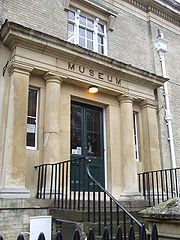
Wisbech & Fenland Museum
Encyclopedia

Wisbech
Wisbech is a market town, inland port and civil parish with a population of 20,200 in the Fens of Cambridgeshire. The tidal River Nene runs through the centre of the town and is spanned by two bridges...
in Cambridgeshire
Cambridgeshire
Cambridgeshire is a county in England, bordering Lincolnshire to the north, Norfolk to the northeast, Suffolk to the east, Essex and Hertfordshire to the south, and Bedfordshire and Northamptonshire to the west...
, England
England
England is a country that is part of the United Kingdom. It shares land borders with Scotland to the north and Wales to the west; the Irish Sea is to the north west, the Celtic Sea to the south west, with the North Sea to the east and the English Channel to the south separating it from continental...
, is one of the oldest purpose-built museums in the United Kingdom
United Kingdom
The United Kingdom of Great Britain and Northern IrelandIn the United Kingdom and Dependencies, other languages have been officially recognised as legitimate autochthonous languages under the European Charter for Regional or Minority Languages...
.
The Museum Society was founded in 1835 and the present building was opened in 1847.
The museum houses a number of important collections relating to local history and the anti-slavery campaigner Thomas Clarkson
Thomas Clarkson
Thomas Clarkson , was an English abolitionist, and a leading campaigner against the slave trade in the British Empire. He helped found The Society for Effecting the Abolition of the Slave Trade and helped achieve passage of the Slave Trade Act of 1807, which ended British trade in slaves...
. Its star exhibit is the original manuscript of Charles Dickens
Charles Dickens
Charles John Huffam Dickens was an English novelist, generally considered the greatest of the Victorian period. Dickens enjoyed a wider popularity and fame than had any previous author during his lifetime, and he remains popular, having been responsible for some of English literature's most iconic...
' Great Expectations
Great Expectations
Great Expectations is a novel by Charles Dickens. It was first published in serial form in the publication All the Year Round from 1 December 1860 to August 1861. It has been adapted for stage and screen over 250 times....
, the bequest of Chauncy Hare Townshend
Chauncy Hare Townshend
Chauncy Hare Townshend, born Chauncy Hare Townsend was a 19th century English poet, clergyman, mesmerist, collector, dilettante and hypochondriac...
. Other notable artefacts include Napoleon's Sèvres
Manufacture nationale de Sèvres
The manufacture nationale de Sèvres is a Frit porcelain porcelain tendre factory at Sèvres, France. Formerly a royal, then an imperial factory, the facility is now run by the Ministry of Culture.-Brief history:...
breakfast service, said to have been captured at the Battle of Waterloo
Battle of Waterloo
The Battle of Waterloo was fought on Sunday 18 June 1815 near Waterloo in present-day Belgium, then part of the United Kingdom of the Netherlands...
and Thomas Clarkson's chest, containing examples of 18th century African textiles, seeds and leatherwork which he used to illustrate his case for direct trade with Africa.
External links
- Official website
- Wisbech and Fenland Museum information from The National Archives, UK

